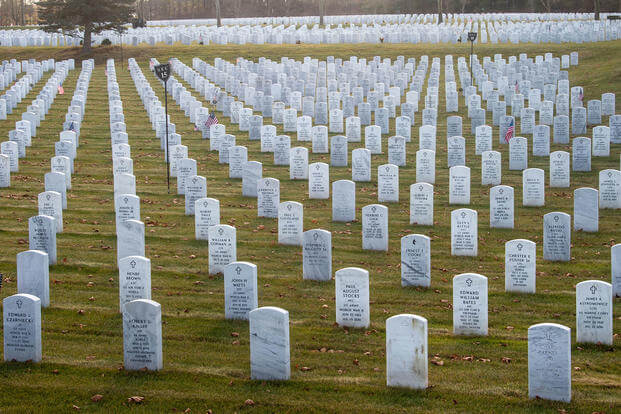As State Vets Cemetery Runs Out of Space, Officials Scramble for a Plan

Connecticut veterans officials are looking for a new solution after local opposition blocked their plan to expand the state veterans cemetery in Middletown, where space for new burials is expected to run out within the next three years.
Veterans groups made a pitch last month for Middletown to sell about 90 acres of open space to the state.
But neighbors argued that their section of Middletown already has more than enough state facilities, and warned that expanding the cemetery could jeopardize a major municipal wellfield. The town council sided with residents and voted down the land sale.
The dispute has left some veterans feeling unappreciated, while some homeowners are complaining that state leaders tried to sneak through the cemetery expansion before residents had a chance to stop it.
Amid a lengthy debate at a council meeting, veteran Philip Pessina of Maple Shade Road said people should remember that such discussions along with free elections are part of what veterans fought for. No matter what Middletown does with the 90-acre property, it should ensure there’s enough room for expanding the cemetery he said.
“My brother and my nephew are buried there. I was appalled when I went on this past Saturday to lay flags on the 13,000 graves to find a small section just for our 2024 veterans,” he said. Pessina said. “The veterans of the past put you all into office. We’re lucky to live in this country.”
The 21-acre cemetery opened in 1984 and has nearly exhausted its capacity for traditional burial plots, Deputy Commissioner Joe Danao of Connecticut Veterans Affairs told the council. There is ample room for crypts and columbarium niches, but standard burial plots will be gone sometime in 2027, according to projections.
The state veterans department was prepared to buy the city-owned property near the cemetery as expansion space, but homeowners insisted it’s the wrong location.
“A change of this magnitude should have been brought to the attention of homeowners. This cannot be undone once it’s approved. This is not the right space,” said Kimberly Inglis of Bow Lane. “My grandfather was a veteran. But this is not the place.”
Like many owners near the cemetery, Inglis said the neighborhood has been forced over the years to accept too many unpopular developments, including the sprawling Connecticut Valley Hospital as well as the Kleen Energy power plant. Neighbors banded together as RAID — Residents Against Institutional Dumping — in the 1980s to block a proposed alternative jail, and secured agreement by state and local officials that the 90-acre tract would remain open space or be used for recreation but nothing else.
But with the nearby cemetery nearly out of room, the council considered selling the land to the veterans department. Bow Lane resident Ralph Wilson said he believes state officials tried to push through the cemetery expansion with no notice.
“You’ve been asked by the state to secretly hide the facts of this transfer and to prevent your constituents from having the opportunity to comment,” said Wilson.
He said homeowners near a cemetery expansion could expect a roughly 12% drop in property values, and warned that using land within the Roth aquifer protection zone could risk the town’s drinking water and individuals’ well water. Others said the 90 acres serves as a wildlife habitat.
Ken McClellan, president of The Greater Middletown Military Museum, said he was surprised by the level of opposition.
“The veterans are concerned that the remaining burial spaces are fewer than the number of veterans in Connecticut. We thought this would be a good solution,” he said Monday. “We don’t see this having a large impact on the neighborhood and people living there.”
McClellan said the questions about water contamination were “possibly less than fully informed,” and noted the cemetery has been in place nearby for 40 years without incident. There are concrete vaults in place to hold the coffins for future burials, he noted.
If the 90-acre parcel doesn’t work, McClellan and other veterans are hoping the state or city will find other land very close by. Creating space farther away in the city or in a different community would be wasteful, he said.
“There’s a lot of open land around CVH right there. Using land in another town means a significant amount of money for another (maintenance) crew, more equipment, another building. The most reasonable answer is right here where it can be run by the current crew,” he said.
And for survivors, Middletown is enormously convenient for cemetery visits, he noted.
“This is centrally located and accessible from 91, 9, 84,” he said. “It makes sense.”


